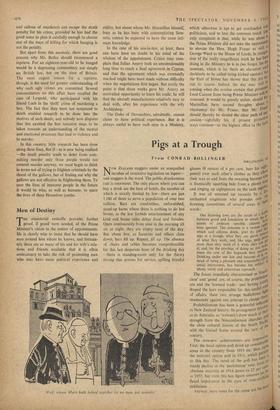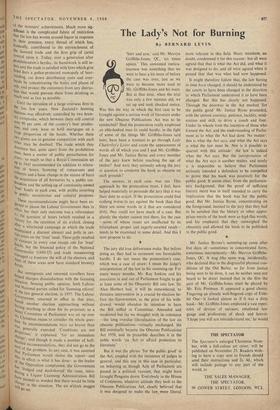Pigs at a Trough
From CONRAD HOLLINGER
WELLINGTON, r41 N. ZEALAND staggers under an unequalled incubus of restrictive legislation on liquor— and staggers is the word. The public drunkenness late is enormous. The only places Where you can buy a drink are the bars of hotels, the number of which is strictly limited by law—there are just 1,100 of them to serve a population of over two million. Bars arc comfortless, unfurnished, stand-up barns where there is nothing to do but booze, as the law forbids entertainment of any kind and house rules debar food and females. Open continuously from nine in the morning till six at night, they are empty most of the day. But about five, as factories and offices close down, bars fill up. Repeat, fill up. The absence of chairs and tables becomes comprehensible for this last desperate hour of the drinking day --there is standing-room only for the thirsty throng that presses for service, spilling brimful
'Well. witom Mw.v bath joined loge her hi no man put asunder.'
glasses (8 ounces of 6 per cent. beer for eighwt' pence) over each other's clothes as they All:, their way to and from the sweating barman ": is frantically squirting beer from a plastic O' and ringing up cightpences on the cash regisfe;f' It was all summed up recently by a di,'S; enchanted magistrate who presides over 1" licensing committees of several areas in the words; Our licensing laws are the result of between greed and fanaticism in which the ,c Wrests of ordinary sensible citizens ""Acr been ignored, The outcome is a system 011,e which said citizens drink, jowl by jowl like pigs at a trough, what they arc given A w uss of what they want, and, like pigs, gulf u°,.et more than they need of it while they Canruy it; and, for the privilege of doing so, pa). ni10;/ times the cost of the hogwash they Drinking under our law and because of ":,,-to stead of being a pleasant and respectable 37 of social intercourse, has become the sub/cc' idiotic mirth and censorious reproach. The forces impolitely characterised as ,fanatl cism' and 'greed' are, of course, the prohibition ists and the licensed trade: and having Ylintic shaped the laws responsible for this sordid Obi of affairs, these two strange bedfellows figro, strenuously against any attempt to change thence Prohibitionism has been a powerful jail° 0, in New Zealand history. Its protagonists (lonk`eir as in Australia, as 'wowsers') drew much of t"nd strength from the Nonconformist churches 3.6c the close cultural liaison of the South Paclhe with the United States around the turn of century.-ye. The wowsers' achievements are imPres- kle First, the local option poll dried up considerar;e areas in the country from 1893 on; then cats the national option poll in 1911, which Persi 3 to this day. The trend of the poll has hecria0 steady decline in the 'prohibition' vote. Wrnent, absolute majority in 1914 down to 23 Per in, leitd in 1957; but even this last figure assumes ao. paot importance in the .eyes of vote-catclv" fl least Anywany, mere votes for the cause are the THE SPECTATOR. NOVEMBER 4, of the wowsers' achievements. Much more sig- nificant is the complicated fabric of restriction that the law has woven around liquor in response to their pressure, every thread of which has, ironically, contributed to the entrenchment of the licensed trade and the firm grip •of cartel control upon it. Today, over a generation after Prohibitionism's heyday.-its handiwork is still in- tact, and the trade is satisfied with laws which give hotel bars a police-protected monopoly of beer- vending, cut down distribution costs and over- heads by concentrating the hairs and places of s'de, and protect the customers from any distrac- tion that would prevent them from drinking as much and as fast as possible.
Until the intrusion of a large overseas firm in the last few years. New Zealand's brewing business was effectively controlled by two brew- erY companies, which between them still control over 80 per cent. of the country's beer produc- tion, and own, lease or hold mortgages on a large proportion of the hotels. Whether these tW° giants are in genuine competition with each other may be doubted. The trade which . they dominate has, quite apart from the prohibition issue. been a matter of public perturbation, for Years—so much so that a Royal Commission set ill!) in 1945 recommended (in addition to relaxa- t" of hours, licensing of restaurants and cabarets and a basic change in the nature of bars) the acquisition of all breweries by a public cor- poration and the setting-up of community-owned trust' hotels in each area, with profits reverting Le Public recreational and cultural purposes. These recommendations might have been ex- Peeled to please the Labour Government then in °ince, but their only outcome was a referendum the question of hours (which resulted in a 'let°rY for the retention of six o'clock closing after a whirlwind campaign in which the trade maintained a discreet silence) and polls in cer- ltlin areas on the 'trust' issue. These polls resulted h victories in every case except orfe for 'trust' hotels, but the financial policy of the National c evernment (1949-57) and trade manoeuvring ianaged to frustrate the will of the electors, and most °St of these areas now have standard brewery hotels, But immigrants and returned travellers have helped sharpen dissatisfaction with the licensing situation. Sensing public opinion, both Labour 1 ud National parties called for 'licensing reform' 4.t the last general election, in 1957. The Labour t'overnment, returned to office in that year having another election approaching without Select anything to show for its promises; so a ,,e'ect Committee of Parliament was set up over Lion. Christmas recess to consider the whole ques:- 14,1°n. Its recommendations were no .braver than generally expected 'Conditions are not ZitPitious,' it explained. 'for an immediate _nge'; and though it made a number of half- hearted recommendations. they did not go to the tkot of the problem. In any case, it was assumed l'Ot Parliament would shelve the report—and t's• in effect, is what it has done: as the leader h,the Opposition complained, the Government (ills odged and duckshoved' e issue, tro- (ri eing a Liquor Licensing Administrationin Bill WehW Passed) so worded that there would be little in the situation. The six o'clock stagger " -' go on.















































 Previous page
Previous page